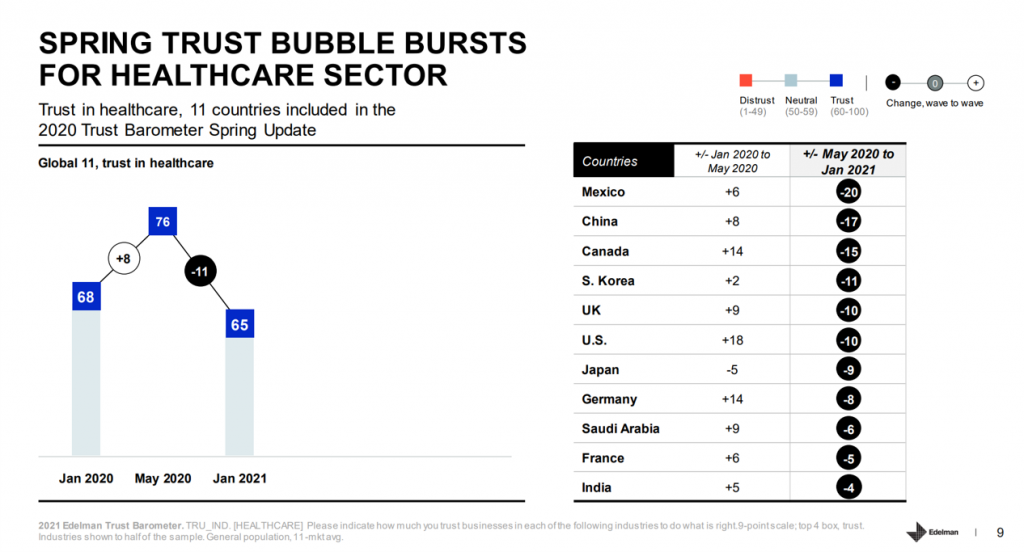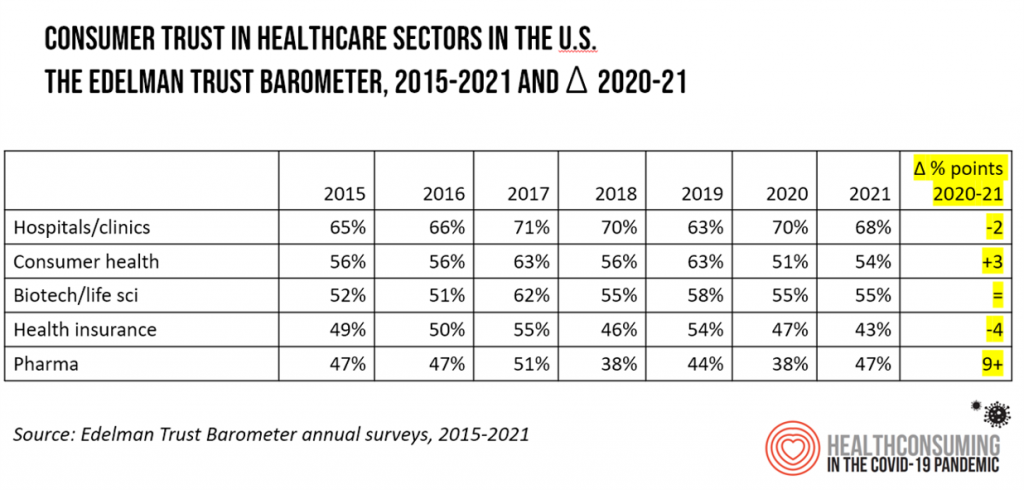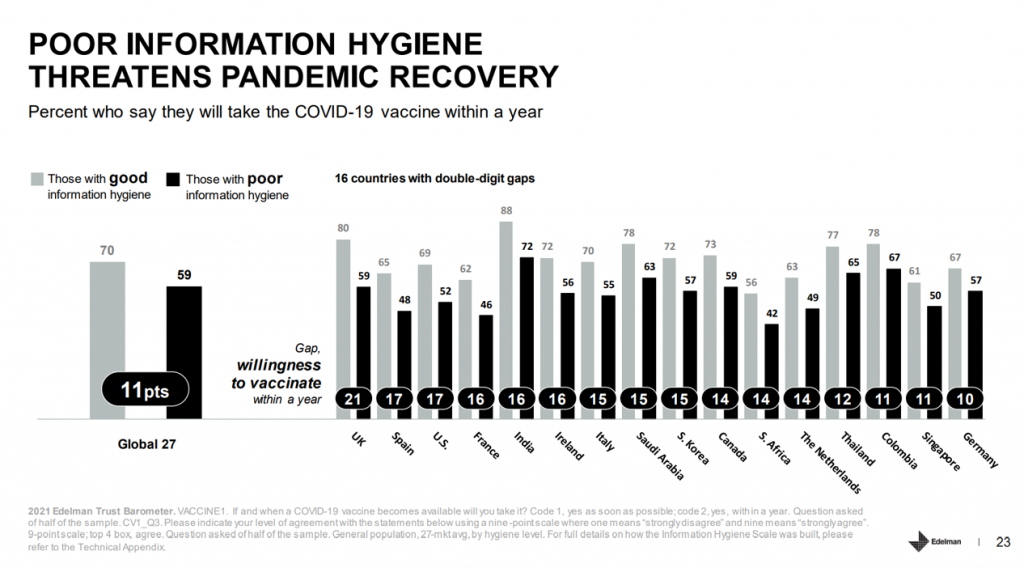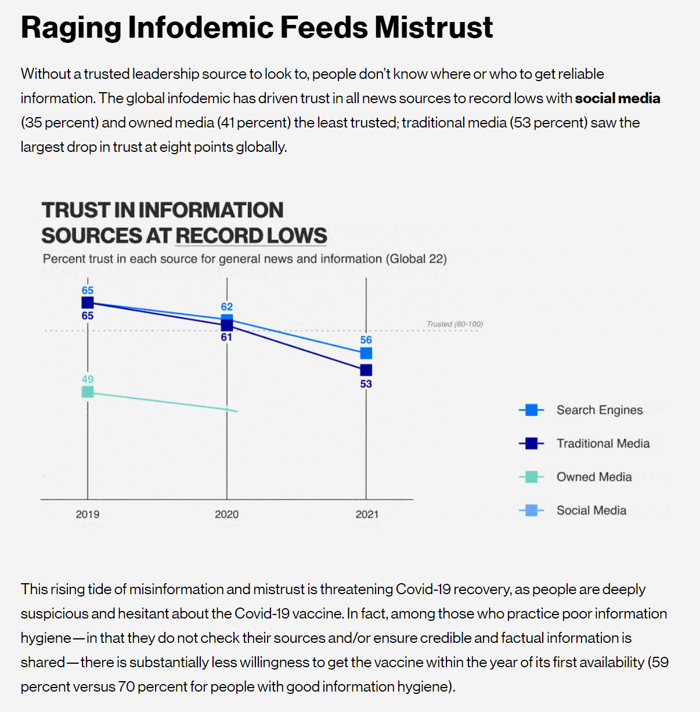You’re stressed, I’m stressed; most of us have felt stress in the COVID-19 era which began in the U.S. in the first quarter of 2020.
Nearly eighteen months later, a  2021 Edelman Trust Barometer update finds that consumers’ trust in the health care industry is under stress, too — in the U.S. and around the world.
2021 Edelman Trust Barometer update finds that consumers’ trust in the health care industry is under stress, too — in the U.S. and around the world.
The first chart from the Edelman health care update demonstrates that in most countries polled, health citizens’ trust in health care was buoyed in the first five months of 2020 (January through May): up 18 points in the U.S., 14 points in Canada and Germany, and 9 points up in the UK and Saudi Arabia.
Fast-forward to January 2021, and Edelman’s survey learned that health consumers around the world lost trust in their health care systems from May 2020 to January in the new year. The largest trust-drops were found in Mexico (falling 20 points), China (down 17 points), Canada (declining 15 points), South Korea (a drop of 11 points), and the UK and US, both with reductions in trust of 10 points.
 Let’s focus in on the U.S. now, looking at health citizens’ trust in five segments of the health care industry between 2015 and 2021.
Let’s focus in on the U.S. now, looking at health citizens’ trust in five segments of the health care industry between 2015 and 2021.
I’ve tracked the Trust Barometer for many years, and so have kept data on a spreadsheet reflected in the table I curated here.
Year-on-year, different spikes and ups-and-downs call out for special mention, such as:
- Pharma’s 13-point steep dive to 38% between 2017 and 2018, dramatically recovering by 9 points in the last year to 47% [with the wild card here of whether U.S. health citizens’ memories will last into 2022 with respect to cross-party desire for the U.S. to approve Medicare’s negotiation of drug prices with pharmaceutical companies]
- Hospitals’ fall from 70% to 63% between 2018 and 2019
- Consumer health’s fall from 63% in 2019 to 51% in 2020
- Health insurance’s decline from 55% in 2017 to 46% in 2018, recovering in 2019 then falling again to a low of 43% this year in the 2021 Barometer.
The one segment which has stayed relatively even from 2018 has been biotech, 55% that year and 55% again in 2021.
 Health Populi’s Hot Points: Two underlying pillars for trust are science-based information and transparency. On these factors, the U.S. is indeed in stress-mode.
Health Populi’s Hot Points: Two underlying pillars for trust are science-based information and transparency. On these factors, the U.S. is indeed in stress-mode.
The third bar chart here from Edelman’s 2021 Barometer asserts that “poor information hygiene threatens pandemic recovery.” Edelman equates the information hygiene challenges as the gap between health citizens willing to vaccinate within a year versus those who are not willing to get the COVID-19 jab.
The vaccination-willingness gap in the U.S. is the second largest in the world at 17 points (tied with Spain for this dubious honor), just behind the UK at 21 and just ahead of France, India, and Ireland at 16.
 Edelman defines “information hygiene” as part of a larger “infodemic” which feeds mis-trust. “Without a trusted leadership source to look to,” Edelman explains, “people don’t know where or who to get reliable information [from].”
Edelman defines “information hygiene” as part of a larger “infodemic” which feeds mis-trust. “Without a trusted leadership source to look to,” Edelman explains, “people don’t know where or who to get reliable information [from].”
This last line chart illustrates the decline in the percent of people who trust various sources of information: all are in decline, whether search engine, traditional medium channel, or social media.
The lack of trusted information sources serves to split health citizens with respect to, say, the scientific reasons for wearing a facial covering/mask or keeping at a “safe” physical distance from others, to whether someone is vaccine-hesitant or -welcoming.
Transparency and education are essential to building trust in vaccines, Edelman concludes in this study, noting that 64% of U.S. health citizens say they will need to understand the science and development process used to create a COVID-19 vaccine before they will fully trust that it is safe. Across the global 27 countries Edelman studied in the 2021 Barometer, the U.S. 64% matches the world’s 27-nation average (one percentage point above Russian consumers, FYI).
This large one-third of U.S. residents still hesitant to get vaccinated indeed threatens pandemic recovery — both in terms of economic growth and in terms of national spirit and comity, a civil society.
